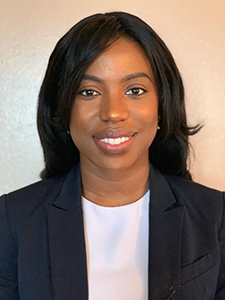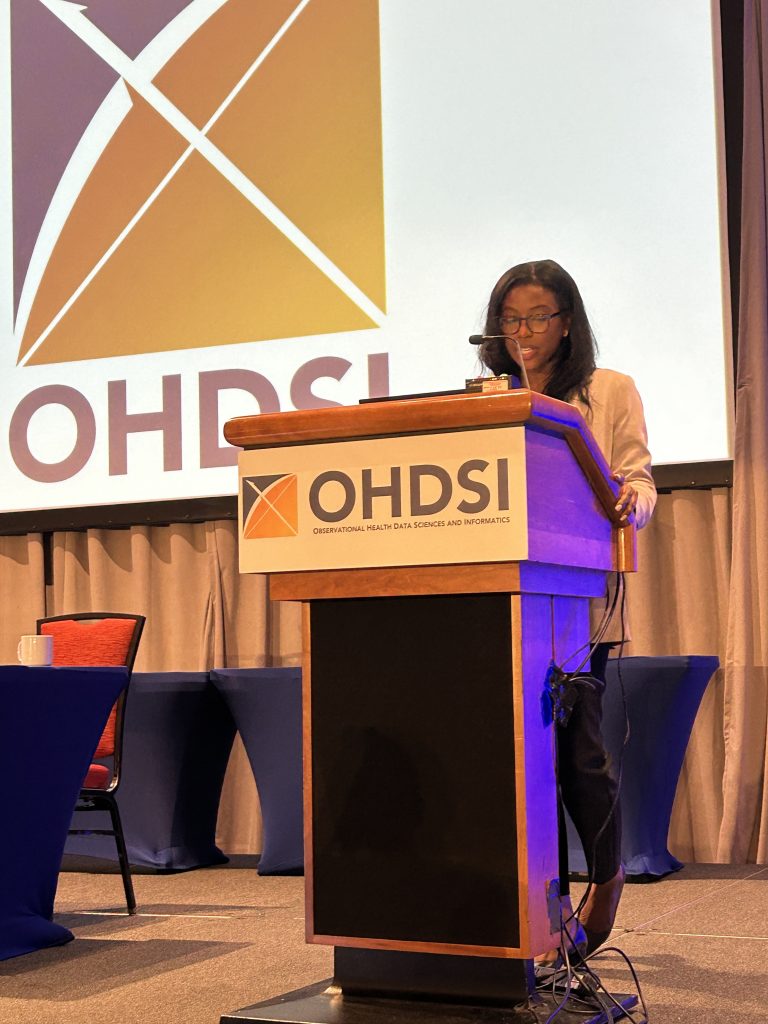- Who We Are
- Updates & News
- Standards
- Software Tools
- Network Studies
- Community Forums
- Education
- New To OHDSI?
- Community Calls
- Past Events
- 2024 Europe Symposium
- 2024 Thailand Tutorial
- 2024 Japan Tutorial
- 2024 DevCon
- 2024 Phenotype Phebruary
- 2023 Global Symposium
- 2023 APAC Symposium
- 2023 Europe Symposium
- 2023 SOS Challenge
- 2023 DevCon
- 2023 Phenotype Phebruary
- 2022 Global Symposium
- 2021 Global Symposium
- 2020 Global Symposium
- ALL Past OHDSI Events
- Workgroups
- 2023 ‘Our Journey’ Annual Report
- This Week In OHDSI
- Support & Sponsorship
- CBER Best Seminars
- 2024 Europe Symposium
- 2024 Global Symposium
- Github
- YouTube
- Newsletters
Collaborator Spotlight: Jody-Ann McLeggon
Jody-Ann McLeggon is a program manager at the Columbia University Irving Medical Center. She focuses specifically on the collaboration between OHDSI and the U.S. Food & Drug Administration CBER Biologics Effectiveness and Safety (BEST) Community Engagement and Development Initiative. She also took a leadership role in leading the global community on the development and execution of four network studies in the 2023 Save Our Sisyphus Challenge.
Jody-Ann spent more than five years at Northwell Health as a research supervisor and coordinator. She managed project portfolios for multisite research projects and oversaw research activities and development within the department. She also managed the implementation of NIH studies, clinical trials, and investigator-initiated studies.
She discusses the collaboration between OHDSI and the FDA, how OHDSI can assist regulator agencies in the active surveillance of vaccines and drugs, lessons she learned about network studies, and more in the latest edition of the Collaborator Spotlight.

What drew you to a career in research and what have been a couple exciting projects you have worked on?
My journey in research started out as an undergraduate student working in a cell biology lab at the beginning of my sophomore year investigating the function of Lark protein in Drosophila melanogaster (fruit flies). Since then, my interest in research has only evolved, and I’ve transferred my knowledge and skills from my wet lab experience to public health. Currently, I’ve been able to participate in many OHDSI initiatives. The most recent one was the Save Our Sisyphus (SOS) Challenge, where we have led the community through all aspects of conducting research study, from initial idea through design and dissemination. I also support our FDA initiative on methods development research for vaccine safety monitoring. I’m also a member of the LEGEND initiative led by Marc Suchard working on LEGEND T2DM.
As the program manager at DBMI, you focus on OHDSI’s collaboration with the FDA. Can you discuss this relationship and how OHDSI assists the FDA?
I think that the OHDSI-FDA collaboration is a unique and important one. It shows us just how important OHDSI is and ways in which we can use OHDSI tools to support regulatory authorities such as the FDA. We provide support to the CBER Biologics Effectiveness and Safety (BEST) Community Engagement and Development Initiative (CEDI) by collaborating with the FDA to convene BEST user community building activities such as meetings, workshops, training, projects and/or related support activities. Two of the more prominent activities are:
- Conducting methods research. OHSDI is responsible for coordinating, developing and conducting methods development research in epidemiological and informatics areas most relevant to the FDA. Currently our focus has been on methods development for vaccine safety surveillance.
- Hosting seminars. In this case OHDSI is responsible for developing and coordinating research seminars. We host seminars every 6 – 8 weeks focusing on various topics most relevant to the FDA CBEST BEST program. Often times these are promoted to our OHDSI community as well. Anyone can attend. It’s also important to note we have had 4 OHDSI collaborators present at these seminars so far in 2023. This goes to show that there’s interest and great need for the solutions OHDSI provides leveraging RWE to conduct large scale analysis.
You led the 2023 SOS Network Study Challenge this year, which featured four network studies developed and run within our community. What stood out to you about OHDSI’s ability to go from idea to dissemination in such a short amount of time?
What stood out to me the most was the vast and powerful resources we have in our community, the sheer number of folks involved in getting the work done and how truly helpful everyone within the community is. We were learning how to conduct studies using OHDSI tools and best practices for complex studies yet it felt like working with a group of friends on a passion project. I think that’s a unique quality within our OHDSI community. We work together on complex tasks and together it feels less complex. We also learned and understood more about the power of Strategus — that has been eye-opening. I’m not a developer so having even the opportunity to increase my awareness was truly impactful. Many thanks to the HADES teams. Knowing that there are recordings to augment the educational tools we already have access to is a great asset.
Obviously there are many more research questions out there, so what are some of the valuable lessons that can be learned from this event and carried forward into future research?
There is true strength in numbers. We were able to take complex clinical questions, activate the community, and complete studies within a relative short time. There are also rich tutorials now available on our website. Knowing that these are available for both veterans and newcomers to OHDSI looking to conduct network studies is amazing. Now anyone can watch the SOS tutorials and feel empowered to conduct their own network study.
I’ve also learned how to better engage with data partners. The SOS Challenge gave me a better understanding of the challenges data partners face while executing a study. While each data partner and study are unique, I’ve learned that strong engagement with data partners as soon as possible is important to the success of your study. Documenting the challenges along the way also allows us to share experiences with the community to improve the process of conducting network studies.
 How can OHDSI be valuable to the FDA and other regulatory agencies in terms of active surveillance of vaccines and other drugs?
How can OHDSI be valuable to the FDA and other regulatory agencies in terms of active surveillance of vaccines and other drugs?
OHDSI’s value to regulatory agencies was one of the highlights at the 2022 OHDSI Global symposium. We’ve been able to contribute to methods development research here in the US. One such notable contribution is our Bayesian Safety Surveillance with Adaptive Bias Correction project led by Dr. Fan Bu. We’ve seen OHDSI’s work being used to support the European Medicines Agency (EMA) under the DARWIN-EU initiative led by Dr. Peter Rijnbeek and similarly Dr. Seng Chan You has been supporting the Korea Ministry of Food and Drug Safety on their efforts to Replicate clinical trials in electronic health records. A part of OHSI’s value is in addressing the need for large scale reproducible evidence generation in the post market world.
What inspires you most about OHDSI and the collaboration that happens within the community?
The sense of community and support inspires me the most. Together as a community we challenge and support each other. No matter the task, or how challenging it may initially seem, there’s someone in the community that’s willing to help. Sometimes in the world of research we think and work in silos but in OHDSI we conquer those challenging clinical questions together.
What are some of your hobbies, and what is one interesting thing that most community members might not know about you?
Not so sure how much of a hobby this is but I do enjoy going for a run quite often, no matter the season. I can clear my mind, reconnect, refocus. I’ve also began hiking too and most recently hiked up paths in Nuns Valley, Madeira.
